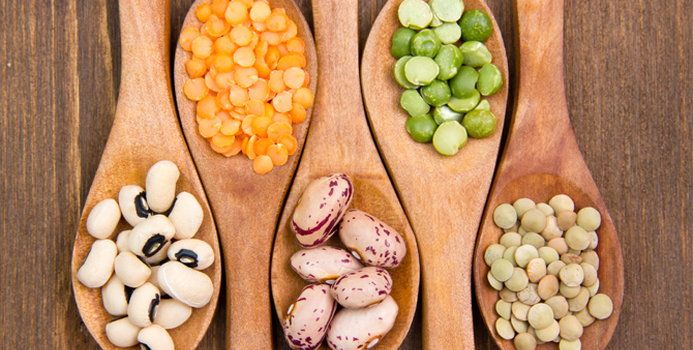Beans are protein packed energy capsules with a nutritional food value that can improve a person's health in many ways. Unfortunately, beans do not have the best reputation. Beans are often shied away from for their potential side effect of flatulence, as well as the fact that they are referred to as the "poor man's meat." These stigmas can easily be remedied with smart cooking practices and maybe a little Beano (over the counter gas reducer). As for the poor man reference, no one really cares anymore. Known as legumes, beans are made up of so many different varieties, it's hard to keep track. Among black, red and white beans there are chick peas, soy beans and even peanuts. Below is the nutritional breakdown of beans.
Protein
If you would like to continue to build and repair your body's tissue as well as have your muscles contract on demand, then add some bean protein to your diet. There are approximately 7 to 10 grams of protein in a half cup of cooked beans. An ounce of beef has 7 grams.
Fiber
Keeping our gastrointestinal tract healthy not only keeps our bodies working properly, but it also helps our weight management. Fiber is the perfect addition to our diet when it comes to these two things. About half a cup of cooked dry beans has about 25 to 30 percent of the daily value of fiber which is also excellent in helping hypocholesterolemia (too much cholesterol in the cells). It is a soluble fiber that reduces blood cholesterol, plus beans release glucose slowly, helping control metabolism which can also contribute to weight loss.
Carbs
Carbs seem to be the enemy of so many diets these days. Like it or not, we need them for energy and brain function, so you may as well get them from a reliable source. Beans hold about 25 grams of carbohydrates per serving.
- Preparation Tip: Discarding the water the beans are soaked or packed in removes oligosaccharides, simple sugars that can cause gas.
Vitamins
Beans are packed with B vitamins. B complex is made up of eight vitamins: thiamine (B1), riboflavin (B2), niacin (B3), pantothenic acid (B5), pyridoxine (B6), cyanocobalamin (B12), folic acid and biotin. This incredible little community is essential in contributing to everything from liver, skin, hair and eyes, to intestinal wall muscle health and the breakdown of carbs, fats and proteins. Beans retain about 70 percent of their B vitamins (after preparation) as well as high levels of folate, which helps form red blood cells.
Minerals
Minerals are the building blocks of the body that form and maintain bones, blood and skin, to name a few. Iron, magnesium, phosphate, manganese, calcium, copper, zinc and potassium are all found in beans.
Lipids
Polyunsaturated fat and no cholesterol are why beans continue to be an optimal dietary choice. Lipids create stored energy (mostly linoleic acid in beans) and the chemical structure is low fat.
Calories
We've recently been overwhelmed with calorie advertising on everything from your morning coffee to your afternoon sandwich. Half a cup of beans holds about 100 to 120 calories, so go ahead, have a feast!



